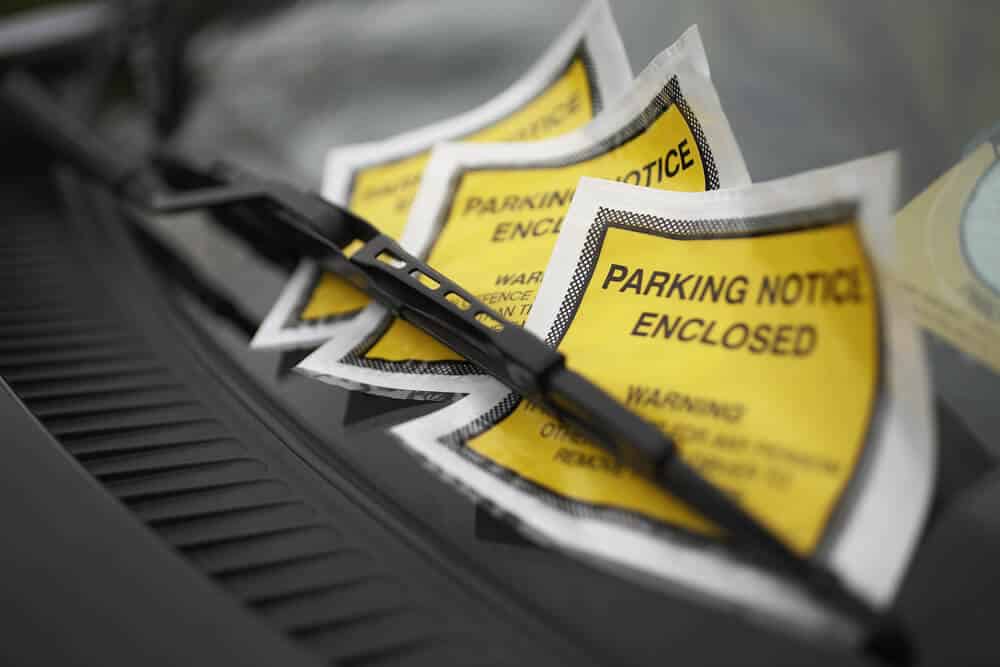There aren’t many things as frustrating as getting back to your car and finding a parking ticket stuck to the windscreen. The good news is, not all parking tickets are the same – and there are some situations that mean you may not have to pay your fine.
We can’t remove the frustration of a ticket – but when you’ve finished reading, you’ll have a better idea of what your next steps should be.
Write off up to 81% of your debts – Check if you qualify
The different kinds of parking tickets
Before you do anything else, it’s a good idea to investigate your ticket and work out exactly what you’ve been issued with.
There are three main kinds of parking ticket in the UK:
- Parking Charge Notice (private PCN)
- Fixed Penalty Notice (FPN)
- Penalty Charge Notice (PCN) or Excess Charge Notice (ECN)
It’s easy to mistake one type for another, especially if a private company is trying to make its ticket look more official than it actually is. By reading the wording carefully and looking at who issued the ticket, you should be able to work out what you’re dealing with.
Let’s take a look at each in more detail.
Parking Charge Notice (private PCN)
Private PCNs are issued by private companies.
If you’ve received a parking charge notice – it will often be referred to as a ‘PCN’. It’s important to read the actual wording of the ticket though – as you’ll see, there’s a difference between a Parking Charge Notice and a Penalty Charge Notice, although they’re both called PCNs.
This kind of ticket is very common – with an average of 23,000 private PCNs issued every day between April 2021 and March 2022.
These are referred to as ‘private PCNs’ or ‘private parking tickets’ because they are issued by a private company acting on private land. For example, your local shopping centre will usually have a parking company that runs their multi-storey car park – and it’s a similar situation with a hospital or supermarket car park.
Since these tickets are issued by private parking companies and not the police or council, they’re not issuing the ticket because you’ve broken the law. Instead, they’re giving you a ticket because you’ve broken your contract with them.
Don’t remember signing a contract? Unfortunately, this isn’t how these tickets work.
When you park in a car park run by a parking operator, you should see a series of signs and machines that set out the parking rules and tell you about the charges. If you break these rules – say by not paying or staying too long – then you’re considered to have broken these rules. In legal terms, this would be known as a ‘breach of contract.’
You’re not breaking the law if you don’t pay this kind of ticket – but since there was a contract in place, even if it’s not a paper one, the law is generally on the side of the private car park operators. The company will chase you for payment and possibly take you to court if you don’t pay.
Debt Calculator
Penalty Charge Notice (PCN) or Excess Charge Notice (ECN)
PCN and ECN charges are usually issued by local authorities or local traffic wardens.
PCNs are commonly issued by local councils in the UK for violations of parking restrictions, minor moving traffic offences (like driving in a bus lane or through a “no entry” sign), and for not paying a congestion charge in areas where it applies. ECNs are similar – although they tend to relate to off-parking areas like council-run car parks.
The amount due for a PCN or ECN can vary depending on the violation and local authority – although it’s generally between £70 and £130. That said, if paid promptly (usually within 14 days), there is often a 50% discount.
The council can obtain the registered keeper’s details from the DVLA (Driver and Vehicle Licensing Agency) if the charge remains unpaid. If ignored completely, the charge usually increases, and the council can enlist the services of bailiffs or debt collection agencies to recover the amount.
Both PCNs and ECNs are legal measures used by councils to enforce regulations and are not criminal charges, but ignoring them can lead to further financial penalties.
Fixed Penalty Notice (FPN)
For parking offences, these are usually issued by the police, local council or Driver and Vehicle Standards Agency (DVSA).
Unlike the other parking tickets we’ve talked about, fixed penalty notices are issued for actually breaking the law – not just breaking rules that relate to parking.
When it comes to parking offences, this type of ticket is usually issued by the police or local authorities for things like parking in restricted areas, obstructing the pavement, or parking without displaying a valid permit – although there are other similar offences.
Usually, you’ll be given 14 days to pay the fine that’s been issued rather than face prosecution. If the fine goes unpaid, it may increase and you may find yourself facing further legal action – including being taken to court.
Which tickets must be paid?
Now we’ve explored the different types of parking ticket, we can look in more detail about which must be paid – and what the consequences are if they’re not.
Do I have to pay a Fixed Penalty Notice (FPN)?
An FPN is a legal notice, i.e. issued because the person or system that has created it thinks you’ve broken the law. As such, you have to follow the guidance that goes along with a fixed penalty notice.
If you do not pay an FPN within 28 days, the cost of the ticket will typically increase by 50%.
Should you ignore the FPN for longer, you’ll eventually be prosecuted. You’ll get a letter to your home address letting you know the police intend to take you to court if you do not pay. If your case goes to court and you are found to be liable for the ticket, you’ll almost always be asked to pay a larger fine as well as court costs.
If you feel the FPN was justified, it’s a good idea to pay it before the cost goes up and you’re asked to attend court. If you feel the ticket was issued incorrectly or that you actually didn’t break the law, you should follow the official appeals process.
Do I have to pay a Penalty Charge Notice or Excess Charge Notice?
Although penalty charge notices (PCNs) and excess charge notices (ECNs) are different to fixed penalty notices (FPNs), the rules around whether or not you have to pay are largely the same.
You’ll typically have 28 days to pay your fine. If you don’t settle the cost within this time, it’ll go up by 50%.
If you hold off beyond this, the local council that issued the ticket will get in touch with the Driver and Vehicle Licensing Agency (DVLA) to get your contact details – then you’ll receive a ‘Notice to Owner’ document through the post. The letter typically gives you another 28 days to pay the fine. If you decide against paying at this stage, the council (or anyone else who’s issued the ticket) will then register the amount you owe as a debt.
Should you ignore requests to pay this debt, the council will treat it in the same way they would a council tax debt – eventually getting a court order to send a bailiff (also known as an ‘Enforcement Agent’) to your home.
If things get to the stage where bailiffs are coming to your home to try to recover the debt, the cost of the debt will almost always have gone up significantly. Even if the original fine was less than £100 – it’s not uncommon to see £500+ of costs added to cover court and enforcement costs.
Do I have to pay a private Parking Charge Notice?
While FCNs, ECNs, and PCNs are all backed by the law from the very beginning, private PCNs are different. Since this is a breach of contract, the consequences for failing to pay private parking tickets are more like failing to pay a mobile phone bill.
Unless the company that issued the private parking ticket takes you to court and convinces a judge that you owe the money, you’re not legally obliged to make payment.
This might make it sound like you can just ignore private parking charge notices, but in reality, this will very rarely work.
The company that issued the private parking fine will usually give you 14 days to pay the ticket at a reduced rate. After that, the charge will go up. You won’t typically hear from the company at this stage -but if you ignore it long enough, you almost certainly will.
Most private parking companies are members of an Accredited Trade Association, which means they can ask the DVLA for your contact details. When they do, they will send payment reminders, add extra admin fees, threaten to take you to court, and possibly pass the debt onto a debt collection agency.
Of course, you can ignore all of the above – but it’s a risky approach. In rare instances, the company may decide it’s not worth pursuing you – but more often than not, they’ll do exactly the same thing that a phone, credit card, or personal loan company will do – take you to court. If they apply for a CCJ and the court decides you owe the money, you’re then legally bound to pay it back, with possible bailiff action further down the line if you don’t.

How we helped Paige
It was literally the best decision of my life, and it has actually changed my life, cheesy as that sounds, it has changed my life.
Paige , IVA Customer
Do lots of people get away with not paying parking tickets?
No matter what you read on forums or social media, the vast majority of people pay parking fines if they’ve broken the law or broken the contract they have with the parking provider. Those who don’t will almost always end up being prosecuted by the police or local authorities – and private companies will usually get what’s owed, even if it means taking you to court.
In short, ignoring any ticket and hoping you slip through the system isn’t a good plan – not least because the cost of the ticket will go up the longer you hold out. If you end up with a CCJ as a result of a ticket, it will be logged on your credit file, so will seriously hurt your credit score. This will make it harder – or impossible – to get credit until the CCJ is eventually removed.
That said, not everyone pays parking tickets. If you want to avoid the fine the right way, you’ll need to lodge an appeal.
Appealing or challenging your parking ticket
Although all parking tickets can be frustrating, it’s especially frustrating to receive one if you don’t think it was justified. If this is the case for you, it’s worth digging deeper into the appeals process.
An ‘appeal’ is your way of officially saying that you don’t think you should have to pay the ticket or that it shouldn’t have been given in the first place.
If you want to appeal, you’ll need to make sure you do it within the timescales that your ticket outlines.
You’ll need to give a reason for appealing and usually some evidence to support your claim. Evidence might include pictures of obstructed, unclear signs or damaged ticket machines, information about the area surrounding your vehicle, or possibly even a written statement explaining why you don’t think you should have to pay the fine.
The ticket you’ve been given will have information on there about how to make your appeal. It will usually tell you to put your information in writing to whoever has issued your ticket. If you write a letter, it’s important to include the following:
- The reference number from your ticket
- Your vehicle registration number
- The date the alleged offence took place
- Your contact details
- The reason for your appeal
- Any evidence that supports your appeal
The company, council or police force that issued your ticket will usually pause the ticket until a decision is made on your case. This means the cost of the ticket shouldn’t increase while you’re making your appeal.
What are some legitimate reasons that parking charge notices are cancelled?
No matter what you read elsewhere – there’s no tried and tested way of getting a parking ticket cancelled. Each appeal will be looked at on its own merits.
Some common reasons appeals are made include:
- If there’s been an emergency and you’ve had to leave your vehicle unexpectedly
- If you’ve had to leave your vehicle for medical reasons – either your own or someone else’s
- If there was a problem with the machine or system that issues the pay-and-display ticket
- If the person who has issued your parking fine makes a mistake
What are the different stages of the appeals process?
Typically, an appeals process goes through three different stages:
- Informal appeal
- Formal appeal
- Independent tribunal
Most appeals will be handled at the informal stage of the process – especially if your ticket has been issued in error or there’s a clear reason why you don’t have one, a broken ticket machine, for example.
If your appeal is a little more complex – or you don’t like the outcome of the informal appeal, your case can be taken up a level to a formal appeal. This will usually involve more evidence being required – but will be handled by the company, council or police force that’s given you a ticket.
What happens if your appeal is rejected, but you still think the ticket shouldn’t have been issued?
If you’ve taken an appeal as far as you can with the company that’s issued your ticket and they still think you should pay what they’re asking, you might need to take your appeal to the next level again.
If your ticket is a private PCN, you should start by checking whether the company that issued it is part of an accredited trade association, such as the British Parking Association or the International Parking Community.
With all the information you have about the company that’s given you your ticket and the appeals you’ve made so far, you can contact an independent third party to act on your behalf. These services include the Traffic Penalty Tribunal and the IAS (Independent Appeals Service). These services are not affiliated with any parking operators, the council, or the police, so they will work without influence to make sure the outcome is correct.

Why choose YourDebtExpert?
- Write off unsecured debts over £5,000
- Stop interest and charges soaring
- Reduced payments from £85 per month
Conclusion: Do you have to pay a parking charge notice?
If you’re wondering if you should pay a parking ticket, you might be disappointed to find that there’s no quick ‘yes’ or ‘no’ answer. Instead, you should look carefully at the type of ticket you’ve received and the circumstances surrounding the ticket before deciding what your next step should be.
Ignoring a ticket is very unlikely to work in your favour. The best outcome of this is being chased by debt collection companies and eventually having to pay – and in the worst cases, you may end up facing prosecution, bailiff visits, massively increased costs, and a damaged credit rating if you avoid the issue for too long.
If you’ve got a ticket and you think it was justified, then paying before the cost goes up is the best route to take. If you feel like your ticket wasn’t justified, then don’t be afraid to appeal – it’s not uncommon for errors to take place, and your ticket issuer will pause any increases in cost while your appeal is investigated.





